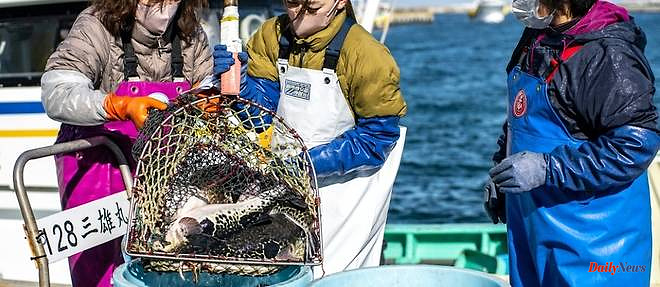Masahiro Ishibashi and his colleagues are satisfied: once again, they return to port with their boats full of fugu, a fish which, once rid of its deadly poison, is an exceptional delicacy of Japanese gastronomy.
Fishermen unload their cargo of greasy, black-spotted fugu. Their families, who were waiting for them, hasten to pick up fish that have slipped on the quay: they are too precious to be wasted.
"We catch attractive fish and attract the attention of consumers. We can show them that Fukushima fish is safe and delicious," said Ishibashi, interviewed by AFP.
Their bountiful catches of fugu are one of the few pieces of good news for these fishermen since the devastating 2011 tsunami and ensuing Fukushima nuclear accident about 50 kilometers from their port of Matsukawaura, near the small town from Soma (northeastern Japan).
Drastic restrictions have been applied for years on the sale of seafood products from Fukushima, as they risked having abnormal levels of radioactivity.
The local fishing industry has been badly affected, especially since these measures have often not been enough to reassure consumers, and the restrictions have only been lifted for two years.
Fukushima fishermen have recently refocused on fugu, learning longline fishing, a technique adapted to catching this fish. Their catches of fugu have increased tenfold in three years, reaching more than 30 tons in 2022.
Yoshimasa Kanno, a local hotelier and restaurateur, is "delighted" with this potential windfall for tourism in the department.
"We used to serve snow crab in winter. This place was known for that. But since the accident (nuclear, editor's note) fishermen can no longer catch as much as before" because their fishing grounds have been reduced, he explains.
"Fugu is delicious and can be served at a good price," says Mr. Kanno, preparing one of these fish for sashimi (strips of raw fish) and frying.
This pufferfish contains an extremely powerful poison, tetrodotoxin, which paralyzes the muscles and causes respiratory arrest in anyone who ingests it.
Fugu is, however, allowed for consumption in Japan, but it can only be prepared by chefs with a special license like Mr. Kanno.
But a new threat now hangs over the future of Fukushima fishermen.
The Japanese authorities have given the green light to gradually discharge more than one million tonnes of contaminated water from the Fukushima power plant into the Pacific Ocean, as the storage capacities on the site are reaching saturation point.
Coming from rain, groundwater or the injections of water needed to cool the cores of the plant's nuclear reactors which melted down in 2011, these huge masses of water have been largely cleaned up but the tritium has not could be eliminated.
According to experts, this radionuclide is only dangerous in high concentrated doses.
A situation a priori excluded in the case of a discharge into the sea spread over several decades, the option chosen by Tepco, the operator of the plant. The process should start this year, under the supervision of the International Atomic Energy Agency (IAEA).
For Masahiro Ishibashi, this solution is unacceptable. “We have worked really hard to regain consumer confidence, but this will destroy our efforts,” he fears.
To improve the image of their products, Fukushima's fishing associations continue to voluntarily monitor the levels of radioactivity in all their catches and impose stricter standards on themselves than those of the public authorities.
If the waters of the Fukushima power plant are evacuated into the ocean, "I fear very much that the fishing in this region will not recover", also confides the chef Yoshimasa Kanno.
15/02/2023 07:46:13 - Soma (Japanese) (AFP) © 2023 AFP












